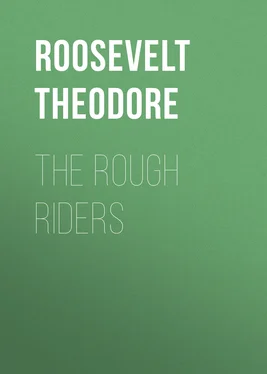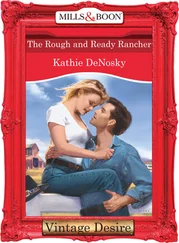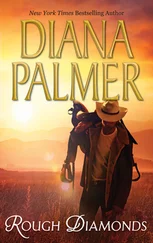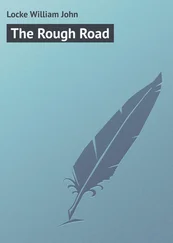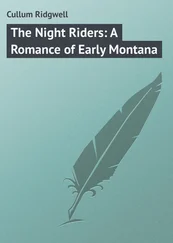Theodore Roosevelt - The Rough Riders
Здесь есть возможность читать онлайн «Theodore Roosevelt - The Rough Riders» — ознакомительный отрывок электронной книги совершенно бесплатно, а после прочтения отрывка купить полную версию. В некоторых случаях можно слушать аудио, скачать через торрент в формате fb2 и присутствует краткое содержание. Жанр: foreign_prose, История, foreign_edu, foreign_antique, на английском языке. Описание произведения, (предисловие) а так же отзывы посетителей доступны на портале библиотеки ЛибКат.
- Название:The Rough Riders
- Автор:
- Жанр:
- Год:неизвестен
- ISBN:нет данных
- Рейтинг книги:3 / 5. Голосов: 1
-
Избранное:Добавить в избранное
- Отзывы:
-
Ваша оценка:
- 60
- 1
- 2
- 3
- 4
- 5
The Rough Riders: краткое содержание, описание и аннотация
Предлагаем к чтению аннотацию, описание, краткое содержание или предисловие (зависит от того, что написал сам автор книги «The Rough Riders»). Если вы не нашли необходимую информацию о книге — напишите в комментариях, мы постараемся отыскать её.
The Rough Riders — читать онлайн ознакомительный отрывок
Ниже представлен текст книги, разбитый по страницам. Система сохранения места последней прочитанной страницы, позволяет с удобством читать онлайн бесплатно книгу «The Rough Riders», без необходимости каждый раз заново искать на чём Вы остановились. Поставьте закладку, и сможете в любой момент перейти на страницу, на которой закончили чтение.
Интервал:
Закладка:
Not a man of them backed out; not one of them failed to do his whole duty.
These men formed but a small fraction of the whole. They went down to San Antonio, where the regiment was to gather and where Wood preceded me, while I spent a week in Washington hurrying up the different bureaus and telegraphing my various railroad friends, so as to insure our getting the carbines, saddles, and uniforms that we needed from the various armories and storehouses. Then I went down to San Antonio myself, where I found the men from New Mexico, Arizona, and Oklahoma already gathered, while those from Indian Territory came in soon after my arrival.
These were the men who made up the bulk of the regiment, and gave it its peculiar character. They came from the Four Territories which yet remained within the boundaries of the United States; that is, from the lands that have been most recently won over to white civilization, and in which the conditions of life are nearest those that obtained on the frontier when there still was a frontier. They were a splendid set of men, these Southwesterners—tall and sinewy, with resolute, weather-beaten faces, and eyes that looked a man straight in the face without flinching. They included in their ranks men of every occupation; but the three types were those of the cowboy, the hunter, and the mining prospector—the man who wandered hither and thither, killing game for a living, and spending his life in the quest for metal wealth.
In all the world there could be no better material for soldiers than that afforded by these grim hunters of the mountains, these wild rough riders of the plains. They were accustomed to handling wild and savage horses; they were accustomed to following the chase with the rifle, both for sport and as a means of livelihood. Varied though their occupations had been, almost all had, at one time or another, herded cattle and hunted big game. They were hardened to life in the open, and to shifting for themselves under adverse circumstances. They were used, for all their lawless freedom, to the rough discipline of the round-up and the mining company. Some of them came from the small frontier towns; but most were from the wilderness, having left their lonely hunters' cabins and shifting cow-camps to seek new and more stirring adventures beyond the sea.
They had their natural leaders—the men who had shown they could master other men, and could more than hold their own in the eager driving life of the new settlements.
The Captains and Lieutenants were sometimes men who had campaigned in the regular army against Apache, Ute, and Cheyenne, and who, on completing their term of service, had shown their energy by settling in the new communities and growing up to be men of mark. In other cases they were sheriffs, marshals, deputy-sheriffs, and deputy-marshals—men who had fought Indians, and still more often had waged relentless war upon the bands of white desperadoes. There was Bucky O'Neill, of Arizona, Captain of Troop A, the Mayor of Prescott, a famous sheriff throughout the West for his feats of victorious warfare against the Apache, no less than against the white road-agents and man-killers. His father had fought in Meagher's Brigade in the Civil War; and he was himself a born soldier, a born leader of men. He was a wild, reckless fellow, soft spoken, and of dauntless courage and boundless ambition; he was staunchly loyal to his friends, and cared for his men in every way. There was Captain Llewellen, of New Mexico, a good citizen, a political leader, and one of the most noted peace-officers of the country; he had been shot four times in pitched fights with red marauders and white outlaws. There was Lieutenant Ballard, who had broken up the Black Jack gang of ill-omened notoriety, and his Captain, Curry, another New Mexican sheriff of fame. The officers from the Indian Territory had almost all served as marshals and deputy-marshals; and in the Indian Territory, service as a deputy-marshal meant capacity to fight stand-up battles with the gangs of outlaws.
Three of our higher officers had been in the regular army. One was Major Alexander Brodie, from Arizona, afterward Lieutenant-Colonel, who had lived for twenty years in the Territory, and had become a thorough Westerner without sinking the West Pointer—a soldier by taste as well as training, whose men worshipped him and would follow him anywhere, as they would Bucky O'Neill or any other of their favorites. Brodie was running a big mining business; but when the Maine was blown up, he abandoned everything and telegraphed right and left to bid his friends get ready for the fight he saw impending.
Then there was Micah Jenkins, the captain of Troop K, a gentle and courteous South Carolinian, on whom danger acted like wine. In action he was a perfect game-cock, and he won his majority for gallantry in battle.
Finally, there was Allyn Capron, who was, on the whole, the best soldier in the regiment. In fact, I think he was the ideal of what an American regular army officer should be. He was the fifth in descent from father to son who had served in the army of the United States, and in body and mind alike he was fitted to play his part to perfection. Tall and lithe, a remarkable boxer and walker, a first-class rider and shot, with yellow hair and piercing blue eyes, he looked what he was, the archetype of the fighting man. He had under him one of the two companies from the Indian Territory; and he so soon impressed himself upon the wild spirit of his followers, that he got them ahead in discipline faster than any other troop in the regiment, while at the same time taking care of their bodily wants. His ceaseless effort was so to train them, care for them, and inspire them as to bring their fighting efficiency to the highest possible pitch. He required instant obedience, and tolerated not the slightest evasion of duty; but his mastery of his art was so thorough and his performance of his own duty so rigid that he won at once not merely their admiration, but that soldierly affection so readily given by the man in the ranks to the superior who cares for his men and leads them fearlessly in battle.
All—Easterners and Westerners, Northerners and Southerners, officers and men, cowboys and college graduates, wherever they came from, and whatever their social position—possessed in common the traits of hardihood and a thirst for adventure. They were to a man born adventurers, in the old sense of the word.
The men in the ranks were mostly young; yet some were past their first youth. These had taken part in the killing of the great buffalo herds, and had fought Indians when the tribes were still on the war-path. The younger ones, too, had led rough lives; and the lines in their faces told of many a hardship endured, and many a danger silently faced with grim, unconscious philosophy. Some were originally from the East, and had seen strange adventures in different kinds of life, from sailing round the Horn to mining in Alaska. Others had been born and bred in the West, and had never seen a larger town than Santa Fe or a bigger body of water than the Pecos in flood. Some of them went by their own name; some had changed their names; and yet others possessed but half a name, colored by some adjective, like Cherokee Bill, Happy Jack of Arizona, Smoky Moore, the bronco-buster, so named because cowboys often call vicious horses "smoky" horses, and Rattlesnake Pete, who had lived among the Moquis and taken part in the snake-dances. Some were professional gamblers, and, on the other hand, no less than four were or had been Baptist or Methodist clergymen—and proved first-class fighters, too, by the way. Some were men whose lives in the past had not been free from the taint of those fierce kinds of crime into which the lawless spirits who dwell on the border-land between civilization and savagery so readily drift. A far larger number had served at different times in those bodies of armed men with which the growing civilization of the border finally puts down its savagery.
Читать дальшеИнтервал:
Закладка:
Похожие книги на «The Rough Riders»
Представляем Вашему вниманию похожие книги на «The Rough Riders» списком для выбора. Мы отобрали схожую по названию и смыслу литературу в надежде предоставить читателям больше вариантов отыскать новые, интересные, ещё непрочитанные произведения.
Обсуждение, отзывы о книге «The Rough Riders» и просто собственные мнения читателей. Оставьте ваши комментарии, напишите, что Вы думаете о произведении, его смысле или главных героях. Укажите что конкретно понравилось, а что нет, и почему Вы так считаете.
